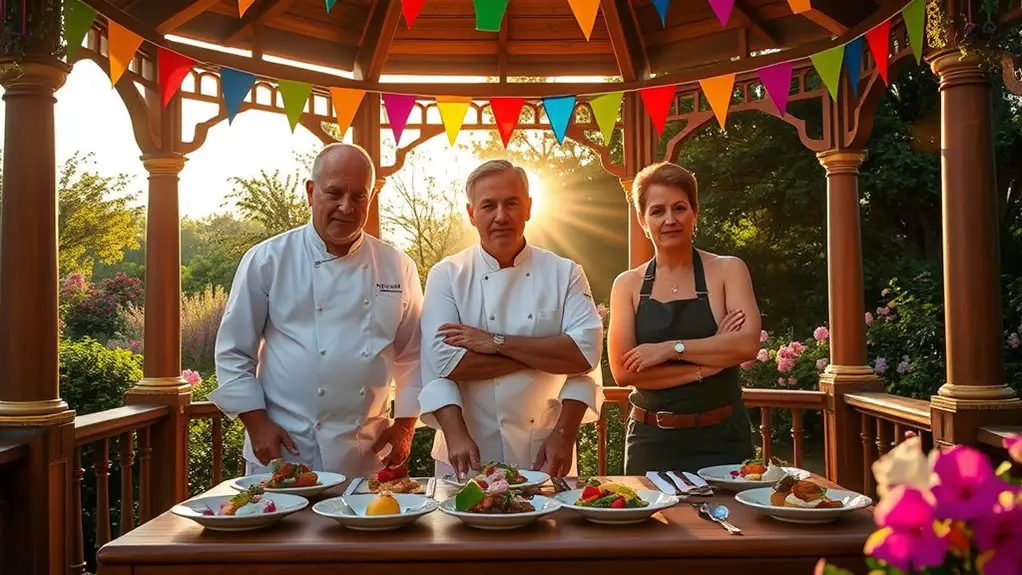To choose the best judges for your gazebo cooking competition, assess their culinary expertise and backgrounds. Look for judges with professional training and diverse culinary experience. Prioritize engaging personalities to captivate both participants and the audience. Balance professional judges with amateur ones for fresh perspectives, and guarantee they understand the competition’s theme. Incorporate interactive elements to engage the audience. If you’re enthusiastic to enhance your event even further, there’s much more to explore!
Assessing Culinary Expertise
When you’re evaluating culinary expertise for a cooking competition, it’s essential to contemplate a judge’s background and experience. A judge with a solid culinary foundation, such as professional training or extensive industry experience, can effectively assess dishes against established judging criteria. Pay attention to their familiarity with current culinary trends, as this knowledge can enhance their ability to evaluate creativity and innovation in the contestants’ dishes.
Additionally, consider their exposure to diverse cuisines, which allows for a broader perspective on flavor profiles and cooking techniques. A judge who appreciates the nuances of various culinary styles can provide valuable insights, ensuring that the competition remains relevant and engaging. Ultimately, selecting judges with robust expertise not only elevates the competition but also inspires contestants to push their culinary boundaries, fostering an environment where creativity thrives.
Evaluating Personalities and Charisma
How do you choose judges who not only possess culinary expertise but also bring engaging personalities to the table? Look for judges with dynamic personality traits that resonate with your audience. Charisma is essential; you want individuals who can effortlessly engage participants and spectators alike. Consider how they communicate—do they have a knack for storytelling or humor? Their ability to connect with others can make or break the atmosphere of your competition.
Don’t underestimate the impact of enthusiasm, either. A judge who’s genuinely excited about food can inspire contestants and create a lively environment. Additionally, assess their adaptability; judges should handle unexpected moments with grace. Finally, seek out those who can offer constructive feedback while maintaining a positive vibe. Balancing culinary knowledge with engaging personalities will guarantee your gazebo cooking competition is memorable for everyone involved.
Considering Diverse Palates
An engaging panel of judges is only part of creating a successful cooking competition; you also need to take into account the diverse palates of your participants and audience. By considering various flavor preferences, you’ll guarantee a well-rounded experience that resonates with everyone. Here are some tips to help you select judges who appreciate international cuisines:
- Culinary Experience: Choose judges with backgrounds in different culinary traditions to bring a wealth of knowledge.
- Flavor Diversity: Look for judges who appreciate a range of flavors—from spicy to sweet—to reflect your audience’s tastes.
- Cultural Sensitivity: Select judges who understand and respect various food cultures, enhancing the competition’s inclusivity.
- Open-Mindedness: Ascertain your judges are willing to embrace new flavors and ideas, encouraging creativity among participants.
Understanding the Competition’s Theme
Understanding the competition’s theme is essential for choosing the right judges. You’ll want to make certain that the judges’ expertise aligns with the theme, as this will enhance the overall evaluation process. By focusing on theme relevance, you can create a more engaging and meaningful competition experience.
Theme Relevance Importance
While you may be tempted to focus solely on the culinary skills of the contestants, grasping the theme of the competition is equally essential. Understanding the theme guarantees that judges can fully appreciate the dishes and their relevance. Here are four key points to reflect on:
- Theme Alignment: Confirm dishes reflect the competition theme to maintain coherence.
- Theme Creativity: Look for innovative interpretations that push boundaries and excite the audience.
- Judging Criteria: Develop clear criteria that emphasize theme relevance alongside culinary techniques.
- Contestant Guidance: Provide contestants with theme-related prompts to inspire their creativity.
Judge Expertise Alignment
Judges play a pivotal role in a cooking competition, and their expertise must align with the competition’s theme to effectively evaluate the contestants. When selecting judges, consider their backgrounds and culinary specialties. For instance, if your gazebo cooking competition focuses on outdoor grilling, look for judges who excel in barbecue techniques or have a strong grilling background. This alignment guarantees that they can provide insightful feedback and appreciate the nuances of the dishes presented. Additionally, judges with varied culinary specialties can offer diverse perspectives, enriching the judging process. Ultimately, matching judges’ expertise with your competition’s theme creates a fair and engaging environment for all participants, allowing them to shine in their culinary endeavors.
Balancing Professional and Amateur Judges
When choosing judges for your cooking competition, it’s essential to balance the expertise of professionals with the fresh perspectives of amateur judges. This mix guarantees a range of experience levels and palate representation, fostering a more inclusive judging process. You’ll also want to maintain fairness and impartiality, so consider how each judge’s background might influence their evaluations.
Experience Level Considerations
As you consider the composition of judges for a cooking competition, striking a balance between professional and amateur judges can enhance the overall experience. This mix not only brings experience diversity but also enriches skill assessment. Here are a few points to keep in mind when selecting your judges:
- Professional Judges: Their expertise guarantees high standards and can provide valuable feedback.
- Amateur Judges: They offer fresh perspectives, making the competition relatable to the audience.
- Varied Experience Levels: Different backgrounds can lead to a more thorough evaluation of dishes.
- Engagement Factor: A mix of judges encourages participation and excitement among contestants and spectators alike.
Diverse Palate Representation
While it’s essential to have experienced judges who understand culinary techniques, incorporating a diverse palate representation can greatly enhance the competition. By balancing professional and amateur judges, you create a panel that reflects a wide range of cultural influences and flavor preferences. Professionals bring their expertise in culinary standards, while amateurs offer fresh perspectives and personal tastes that resonate with everyday cooks. This blend can lead to a richer evaluation of dishes, celebrating creativity and authenticity. Encourage judges from various backgrounds to share their unique insights, as their diverse experiences will enrich the overall competition. Ultimately, this approach not only fosters inclusivity but also makes the judging process more relatable for participants and spectators alike.
Fairness and Impartiality
To guarantee fairness and impartiality in a cooking competition, it’s essential to balance the perspectives of both professional and amateur judges. This balance promotes transparency measures and upholds ethical standards, making sure all contestants feel valued. Here’s how you can achieve this:
- Select a Diverse Panel: Include judges with varying expertise and culinary backgrounds.
- Define Criteria: Clearly outline judging criteria to make certain everyone understands what’s being evaluated.
- Facilitate Open Discussions: Encourage judges to share their thoughts, fostering an environment of collaboration.
- Implement Feedback Mechanisms: Allow contestants to provide feedback on the judging process, enhancing transparency.
Engaging the Audience With Interactive Judging
How can interactive judging elevate the excitement of a cooking competition? By engaging the audience through active participation, you create an electric atmosphere that enhances the overall experience. Allowing spectators to weigh in with interactive feedback not only builds their investment but also fosters a sense of community.
Consider incorporating live polls or Q&A sessions where the audience can ask judges questions about their evaluations. This encourages dialogue and helps demystify the judging process. You might also invite audience members to taste dishes and provide their ratings, making them part of the decision-making.
Such strategies deepen their connection to the competition, turning passive observers into active contributors. Plus, it adds an element of unpredictability that keeps everyone on their toes! Ultimately, embracing interactive judging transforms your gazebo cooking competition into an unforgettable event where freedom of expression and culinary creativity shine.
Frequently Asked Questions
How Many Judges Should I Have for My Competition?
When deciding the number of judges, consider the competition size and diversity of dishes. Generally, three to five judges provide balanced perspectives. Focus on judge selection to guarantee fair evaluations and enjoyable experiences for participants.
What Qualifications Should Amateur Judges Possess?
When selecting amateur judges, make certain they’ve tasting experience and culinary knowledge. They should appreciate diverse flavors, understand cooking techniques, and provide constructive feedback. This’ll enhance the competition and encourage participants to grow in their culinary journey.
Can Judges Taste Food in Advance?
When considering tasting logistics, it’s essential judges don’t taste food in advance. Ensuring judge impartiality helps maintain fairness in the competition, allowing all dishes to be evaluated equally and transparently during the event.
How Long Should Judges Deliberate Before Scoring?
When it comes to deliberation timing, you’d think judges need eons! However, aim for about 10-15 minutes. This balance guarantees scoring fairness while still allowing them to savor the culinary masterpieces you’ve created.
Are There Specific Judging Criteria to Follow?
When judging, you should follow specific criteria like presentation, flavor, and originality. Utilizing effective tasting techniques and clear scoring methods guarantees fair evaluations, allowing you to appreciate the creativity and skill of each dish.

